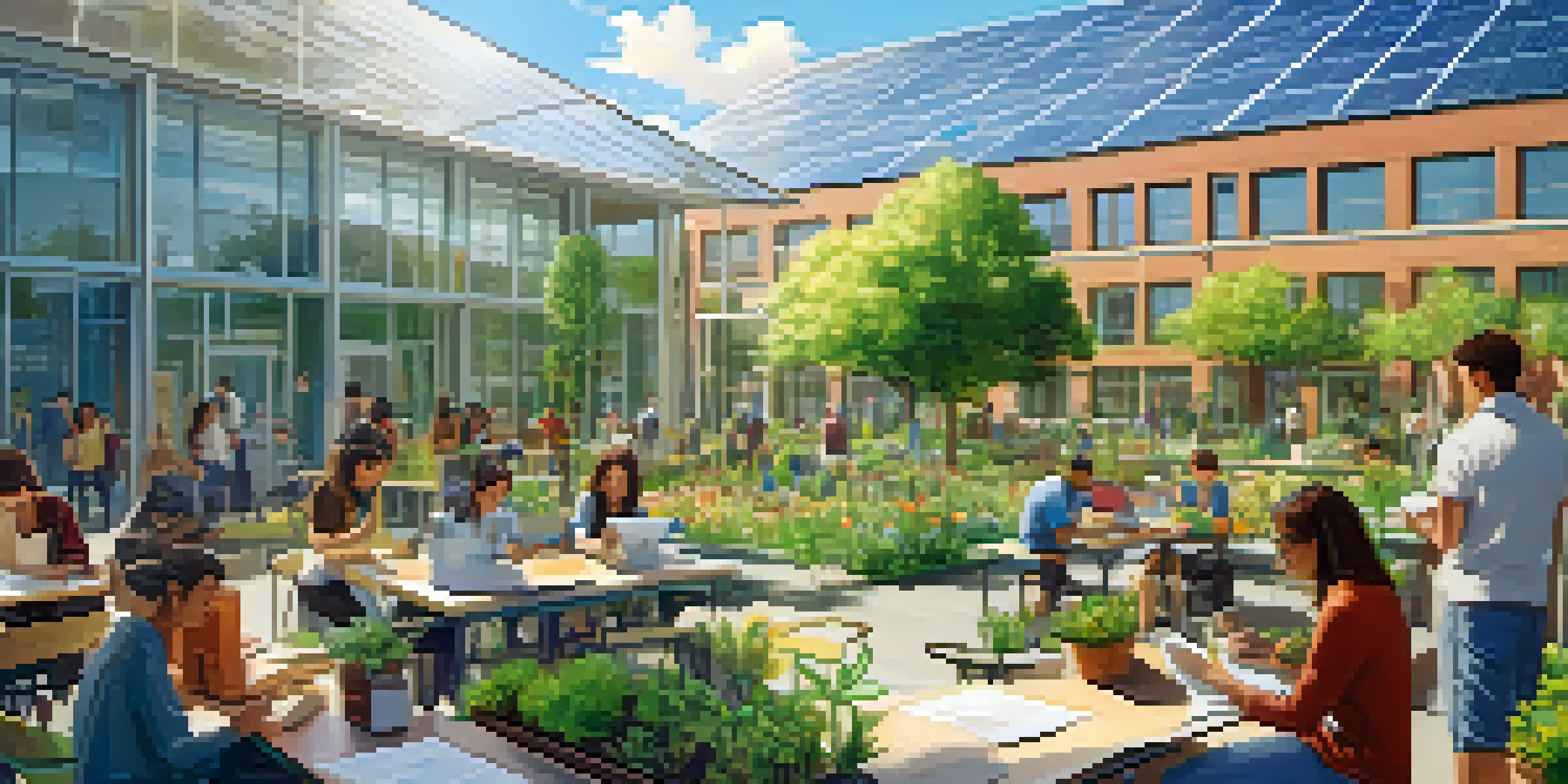The Role of CU Boulder in Advancing Sustainability Research

Introduction to CU Boulder’s Sustainability Mission
The University of Colorado Boulder (CU Boulder) has long been a pioneer in sustainability, embedding eco-conscious practices into its campus culture. This commitment is not merely academic; it reflects a desire to lead by example in addressing global environmental challenges. As climate change continues to impact our planet, CU Boulder aims to foster a sustainable future through innovative research and community engagement.
We do not inherit the earth from our ancestors, we borrow it from our children.
At CU Boulder, sustainability is approached from multiple angles, including environmental science, engineering, and policy. The university champions interdisciplinary collaboration, recognizing that complex issues like climate change require diverse expertise. By integrating these fields, CU Boulder ensures a comprehensive approach to sustainability research and education.
The university's vision aligns with broader global sustainability goals, making it an important player in the academic landscape. By investing in research initiatives that prioritize environmental stewardship, CU Boulder not only contributes to scientific knowledge but also empowers students and faculty to be active participants in creating sustainable solutions.
Key Research Centers and Initiatives at CU Boulder
CU Boulder hosts several research centers dedicated to sustainability, each focusing on different aspects of environmental challenges. Notable among them is the Institute of Arctic and Alpine Research (INSTAAR), which studies climate impacts on ecosystems and communities. This center provides valuable insights into how climate change affects our planet's most sensitive areas.

Another significant initiative is the Renewable and Sustainable Energy Institute (RASEI), which seeks to advance clean energy technologies. This institute plays a crucial role in developing solutions that reduce dependency on fossil fuels while promoting renewable energy sources. Through collaboration with industry partners, RASEI aims to bring innovative ideas from the lab to the marketplace.
CU Boulder’s Commitment to Sustainability
The University of Colorado Boulder integrates eco-friendly practices across its campus and research initiatives to address global environmental challenges.
Additionally, CU Boulder’s Environmental Studies program encourages students to engage in hands-on research projects, fostering a new generation of sustainability leaders. These programs empower students to explore environmental issues and contribute to real-world solutions, bridging the gap between academia and community action.
Interdisciplinary Collaboration for Sustainable Solutions
One of the standout features of CU Boulder’s approach to sustainability is its emphasis on interdisciplinary collaboration. By bringing together experts from various fields—such as ecology, engineering, and social sciences—the university fosters holistic solutions to complex environmental issues. This collaborative spirit enriches research outcomes and encourages innovative thinking.
Sustainability is not a destination, it is a journey that must be taken with determination and commitment.
For instance, projects that explore urban sustainability often involve urban planners, environmental scientists, and policy experts working together. This synergy allows for a more comprehensive understanding of how urban environments can reduce their carbon footprints while maintaining livability. The result? Solutions that are not only effective but also practical.
Moreover, CU Boulder actively engages with local communities and organizations to implement these sustainable practices. By working side-by-side with stakeholders, the university ensures that research is grounded in real-world applications, creating a feedback loop that enhances both academic learning and community resilience.
Student Engagement in Sustainability Research
Students at CU Boulder play a vital role in advancing sustainability research, often participating in groundbreaking projects that shape the future of environmental science. Through various programs and initiatives, students can work alongside faculty mentors, gaining invaluable hands-on experience. This engagement not only enriches their education but also instills a deep commitment to sustainability.
One standout program is the Undergraduate Research Opportunities Program (UROP), which allows students to collaborate on sustainability research projects across disciplines. From studying renewable energy systems to examining local food systems, students have the chance to explore their interests while contributing to meaningful research. These experiences often influence their career choices and reinforce their dedication to environmental stewardship.
Interdisciplinary Research Approach
CU Boulder fosters collaboration among diverse fields to develop holistic solutions for complex environmental issues.
Additionally, student-led organizations, such as the CU Environmental Center, foster a culture of sustainability on campus. These groups organize events, workshops, and campaigns that raise awareness and encourage sustainable practices among students and faculty alike. Through this grassroots engagement, CU Boulder cultivates a community that prioritizes environmental responsibility.
Community Partnerships for Sustainable Impact
CU Boulder recognizes that sustainability is a collective effort, which is why it actively seeks partnerships with local communities and organizations. These collaborations enhance the impact of research initiatives, ensuring that findings are translated into actionable strategies. By working together, CU Boulder and its partners can address pressing environmental issues more effectively.
For example, the university collaborates with the Boulder community on projects aimed at improving local water quality and conservation efforts. This partnership not only benefits the environment but also engages residents in sustainability discussions, fostering a culture of environmental awareness. By involving community members, CU Boulder ensures that solutions are tailored to local needs.
Furthermore, these partnerships often lead to innovative research opportunities that bridge the gap between academia and practice. As students and faculty work alongside community members, they gain a deeper understanding of the challenges faced by local populations, shaping research that is both relevant and impactful.
Innovative Technologies Developed at CU Boulder
Innovation is a cornerstone of CU Boulder’s approach to sustainability, with researchers developing cutting-edge technologies aimed at solving environmental challenges. From advancements in solar energy to breakthroughs in carbon capture, the university is at the forefront of sustainable technology. These innovations have the potential to revolutionize industries and significantly reduce greenhouse gas emissions.
One notable example is the development of more efficient and cost-effective solar panels, which aim to make renewable energy more accessible to the public. Researchers are also exploring ways to integrate renewable energy sources into existing infrastructure, paving the way for a more sustainable energy future. This focus on technology not only benefits the environment but also has significant economic implications.
Community Partnerships Enhance Impact
The university actively partners with local communities to translate research findings into actionable sustainability strategies.
In addition, CU Boulder engages in partnerships with tech companies to bring these innovations to market. By collaborating with industry leaders, the university helps accelerate the transition to sustainable technologies, ensuring that research findings have a tangible impact on the world beyond academia.
Future Directions in Sustainability Research at CU Boulder
As the world grapples with complex environmental challenges, CU Boulder is poised to continue its leadership in sustainability research. The university is committed to expanding its research initiatives to address emerging issues such as climate adaptation and circular economies. This forward-thinking approach ensures that CU Boulder remains at the cutting edge of sustainability science.
Future research endeavors will likely focus on developing solutions that not only mitigate environmental impacts but also enhance community resilience. By prioritizing social equity alongside environmental sustainability, CU Boulder aims to create a holistic framework for addressing global challenges. This vision aligns with the university’s commitment to fostering a sustainable future for all.

Additionally, CU Boulder will continue to leverage its partnerships with local communities, industry, and government agencies to drive impactful research. As sustainability becomes an increasingly urgent priority, CU Boulder’s role as a leader in this field will be more crucial than ever.